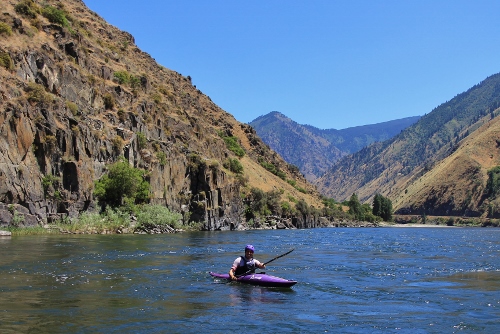
Riverbed Ownership: Legal Decisions That Can Affect River Use
Federal and state courts have historically ruled on issues that affect land and river ownership, and often these decisions impact outdoor companies andoutdoorrecreation enthusiasts. Recently, there have been a few cases making decisions on riverbed ownership, and therefore making decisions regarding control of the river that could affect kayakers, canoeists, paddlers, and recreation river users.

A few months ago, a Maryland Court rejected a party’s argument that, because of a landowner’s “ownership” of the riverbed of the Potomac River, three whitewater outfitters were trespassing on the landowner’s (Potomac Shores) land. The riverbed ownership — which does not occur under current Maryland law — stemmed from a parcel of land which was established at a time when one could own the Potomac riverbed. The Maryland Court of Special Appeals ultimately ruled that Potomac Shoresdid not own the strip that had formed since the late 1800s on the opposite shore. Specifically, the Court stated that “as to the nontidal portion of the river,[Maryland’s] boundary with Virginia shifts as time and the gradual forces of nature alter the location of the Potomac River’s southerly shore.” Thus, the whitewater outfitters (and all river users) can continue to use the currently-in-use river access locations used bykayak, canoe, and raft paddlers along the Potomac River near Harpers Ferry, West Virginia.
On a national level, the Supreme Court has regularly ruled on river ownership issues. For example, in 1980, the Supreme Court ruled that the boundary between Ohio and Kentucky is the low-water mark on the relevant side of the river as it existed when the state was “admitted to the Union.” And in 2003, the Supreme Court ruledthat, “Maryland and Virginia each has a sovereign right to build improvements appurtenant to her own shore and to withdraw water, without interfering with the proper use of the River by the other.”
However, recently,the Supreme Courtissued a decision regarding riverbed ownership in PPL Montana, LLC v. Montana which could impact recreational kayak, canoe, and raft paddlers. The PLL Montana case addressed whether the State of Montana could charge rent to a company which was using the Missouri, Madison, and Clark Fork Rivers to create power with large dams. The decision hinged on whether the riverbeds in multiple river sections were navigable water, and therefore owned by the State of Montana. In its decision, the Court focused on the Great Falls section of the Missouri River.
Because the Great Falls section was not regularly boated or used for commerce in 1889 (as evidenced by Lewis and Clarks portage of the Falls), the Supreme Court ruled that the river section was not navigable. Since the river section was not navigable, the State of Montana could not charge rent to the dam-owner, PPL Montana. This determination is more restrictive than previously-evaluated standards regarding navigable waterways.
The determination of whether a stream or river is navigable is important to an outdoor company or recreational paddler that uses waterways for canoeing, kayaking, or rafting because a positive determination precludes authorities and landowners adjacent to the river/stream/creek from obstructing the waterway. In other words, if a river or stream is deemed navigable then an adjacent landowner cannot erect any restriction (such as wires or fences) to prevent navigability of the waterway by kayaks, canoes, or rafts. While there have been decisions in the past which restricted navigable determinations, thePPL Montana, LLC decision further eroded the likelihood that a whitewater river section will be deemed navigable if evaluated by a court.
While the Supreme Court stated that its decision inPPL Montana, LLC was limited to riverbeds or streambeds, and not surface waters, the Court clearly established that the determination of navigability was extremely restrictive. While many whitewater kayakers have successfully navigated the Missouri River, including Great Falls, the Court stated that it only cared whether an individual in 1889 would have paddled through Great Falls proper. This decision could ultimately allow landowners to more aggressively restrict other recreationally-paddled rivers and streams throughout the country. In response to the decision, the Montana’s attorney general has argued that the decision “doesn’t take away” the State’s stream access rights.
Ultimately, outdoor companies and recreational paddlers should always be respectful of landowners property adjacent to the waterway they are paddling. In light of the decision inPPL Montana, LLC v. Montana, this courteous behavior is even more important because waterway-adjacent landowners may be able to more successfully restrict a paddlers access through such a creek or section of a river.
The expert attorneys at Longman & Van Grack advise all types of Maryland and Washington, DC entities with regard to recreation law, river / property disputes, and appeals. In fact, Adam Van Grack has addressed river access issues for many years. Call (301) 291-5027 if you would like a consultation with our attorneys.
